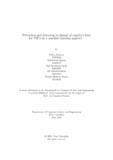Prediction and detection in change of cognitive load for VIP’s by a machine learning approach
Date
2021-06Publisher
Brac UniversityAuthor
Rahman, FahimAhmed, Md.Istiyak
Saad, Saif Shahnewaz
Ashrafuzzaman, Md
Mogno, Sharita Shehnaz
Metadata
Show full item recordAbstract
The significance and urgency of detecting cognitive load of Visually Impaired Person is essential when perception comes while designing an automated navigation
aid for them in unfamiliar indoor environments.Our paper presents a novel, robust
and multidimensional framework based on iterative feature pooling technique which
recursively selects paramount features that maintains relation with the change in
cognitive load of the brain. We have chosen to use Electroencephalogram as it is
one of the fastest imaging techniques available having a high sampling rate and analytical neuro-psychologic benchmarks of perceptive process indicated by rhythmic
activities of the brain. We took the well established ERDS method for indexing the
cognitive load and further developed the work by operating with the band power of
not only the Alpha wave but the Alpha Beta ratio band power and Alpha Theta ratio band power.The intricacy of the tasks in terms of cognitive load were quantified
considering multiple aspects to support the redemption of usability of a way finding
aid by features extraction from specific attributes, some of which were new to this
field, to support the vindication of accessibility of a way finding aid.As the machine
learning classifier the Gradient Boost outperformed all other classifiers(94% accuracy). We considered other performance parameters like the f-1 score,recall, time
delay, sensitivity and false positive rate to evaluate the performance of all available
supervised ML classifiers.This chapter marks out the estimation of based on existing literature, background, leeway, characteristics, and machine learning approaches,
cognitive load was calculated using EEG data.

